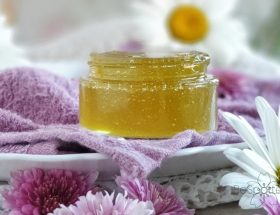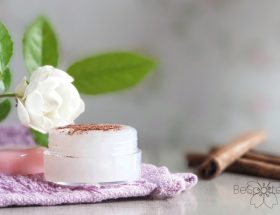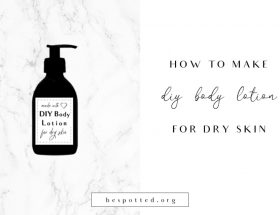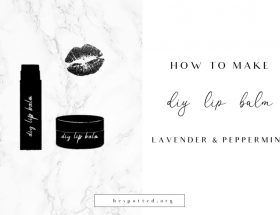This post may contain affiliate links. Any sales made through such links will reward me a small commission – at no extra cost for you!
Scroll down to find out what the benefits of antioxidants for skin are, why they are important and how they delay wrinkles and fine lines, as well as what the best antioxidants for skin are…
If you asked dermatologists what ingredients can help you the most to keep your complexion healthy, glowing and wrinkle-free, antioxidants would be at the very top of their list of recommendations. That is because antioxidants protect the skin against free radicals and that way delay the formation of aging signs.
Antioxidants in Skin Care
Free radicals are amongst the main culprits behind the formation of premature skin aging signs. And we are all constantly surrounded by them.
Free radicals are molecules which miss an electron, and that makes them unstable. To try and become stable, they attack our healthy cells, trying to steal electrons from them. By doing that, free radicals damage our healthy cells and that way speed up the aging process.
If we are talking specifically about the skin, free radicals disrupt the skin’s natural repair system, compromise the skin’s protective barrier, reduce moisture and cause inflammation and breakdown of collagen. With time, all of this leads to dull complexion, flare-ups, fine lines, dark spots and skin sagging.
An overload of free radicals is also known as oxidative stress.
So, what do antioxidants do for the skin? Antioxidants slow down the damage to your skin by protecting the cells against free radicals.
What’s so unique about them is that antioxidants can donate their own electrons to free radicals without becoming unstable themselves. By doing so, they practically neutralize free radicals and prevent them from damaging other healthy cells.
Of course, there are many types of antioxidants and many ways they can help you stay healthy and fit. Here, we will be talking specifically about the best antioxidants for skin, often added to various skin care products, that can help you keep your skin healthy and youthful.
Benefits of Antioxidants for Skin
There are many ways antioxidants benefit your skin, but to sum it all up, antioxidants:
- Protect your skin against free radicals and reduce oxidative stress;
- Prevent photoaging and delay the appearance of wrinkles, fine lines and sagging skin;
- Preserve collagen in the skin and some even stimulate the skin to produce more collagen;
- Reduce dark spots and even out the skin tone, ultimately leading to a brighter complexion;
- Reduce acne breakouts caused by environmental stressors;
- They are anti-inflammatory. They soothe the skin and help it to heal and repair itself;
- Antioxidants can enhance protection against sun damage and prevent sunburn.
Sounds good, right? And, because they primarily work preventively, everyone could use some antioxidants in their skin care regimen, and the best time to start using them would be yesterday.
The only question remaining is which antioxidants are especially efficient at protecting your skin, keeping it youthful and radiant and even reversing some of the already existing damage. So, without further ado, here’s what the best antioxidants for skin are and why everyone should try them out…
The Best Antioxidants for Skin

1. Vitamin C
Being one of the most researched skincare ingredients out there, vitamin C definitely deserves its spot as by far one of the best antioxidants for skin. Vitamin C serums work great when paired with sunscreen, to reduce UV damage and prevent fine lines and dark spots.
Vitamin C also stimulates the production of collagen, keeping the skin firm and supple. It also inhibits the production of melanin, fading discolorations and keeping the skin even and bright.
2. Retinol
Speaking of well researched antioxidants in skin care, retinol is one of the most potent ones you can find. It is available in both over-the-counter and prescription-strength products and it is unparalleled when it comes to reducing wrinkles, fine lines and dark spots, smoothing the texture of the skin and even treating acne.
Retinol is a small molecule, which means it can sink deep into the skin. It stimulates collagen production and encourages the skin to produce new skin cells and that way repair and renew itself.
3. Vitamin E
You can mostly find vitamin E in lotions and ointments meant to treat dry or damaged skin. This is because this antioxidant aids skin repair, soothes it and helps it to heal and recover.
Vitamin E is also often added to vitamin C and other serums because it can help stabilize the other antioxidants. There are also claims that this vitamin could be able to help reduce scars, but unfortunately there is no research data to support this.
4. Niacinamide
Niacinamide, or vitamin B3, is mostly known as a skin brightening agent that helps treat dull, uneven complexion. People often use it to reduce the appearance of enlarged pores, reduce fine lines and improve the overall look and feel of their skin.
Another great feature of niacinamide is that it can encourage the skin to produce more ceramides. It strengthens the skin’s barrier, improves its water-retaining abilities and soothes inflammations.
5. Flavonoids
Flavonoids are phytonutrients that can be found in various fruits and plants and you can often find them on cosmetics ingredients lists in different botanical extracts. They are a type of polyphenols and, like all antioxidants, they protect the skin against the elements and enhance its youthful, healthy appearance.
Flavonoids reduce the loss of collagen and elastin, which both are crucial for the skin to stay supple and wrinkle-free. There are over 4,000 different types of flavonoids, out of which the two that are most beneficial are proanthocyanins (from grapes and pine bark) and flavanols (found in green tea).
6. Ferulic acid
Another great option for anyone looking to protect their skin and keep it firm, supple and radiant. This phenolic compound can often be found in sunscreens due to its photoprotective benefits.
Ferulic acid works best in combination with other skin loving antioxidants, such as vitamins C and E. It soothes the skin, maintains its youthful glow and it can even somewhat improve skin discolorations.
7. Resveratrol
Sometimes referred to as the “longevity molecule”, resveratrol is a great antioxidant for skin conditions such as dull skin, uneven complexion and visible signs of aging. It can be found in fruits such as grapes and berries, specifically in their skin, where it helps protect the fruit from damage.
Resveratrol repairs the skin and has antimicrobial and anti-inflammatory effects. It slows down the photoaging process, reduces redness and diminishes the negative environmental effects.
8. Bakuchiol
Bakuchiol is mostly known as a natural, gentler alternative to retinol. Though this claim is a bit of a stretch, the two do seem to have one or two things in common. Bakuchiol is not as potent as retinol, but it would be a good option for anyone looking to avoid retinol’s infamous sensitizing effect.
This ingredient restores the skin, brightens and soothes it and visibly improves its appearance. It enhances a softer, smoother, more elastic skin and diminishes wrinkles and fine lines.
9. Lycopene
Lycopene is a carotenoid found in tomato, watermelon, rosehip, goji berries, papaya and other red fruits and vegetables. It protects the skin by diminishing the effect of free radicals and reducing oxidative stress.
Lycopene has anti-inflammatory properties and it is a great option for people with sensitive skin. You will also love it if you have acne, oily, congested skin or skin discolorations, but it can be used on any skin type.
10. Coenzyme Q10
Coenzyme Q10 reduces free radical damage and helps keep the skin healthy and youthful. It improves its texture and elasticity by stimulating the production of collagen.
As many others antioxidants, Coenzyme Q10 is naturally present in our skin, but its concentration slowly decreases as we age. Studies show that topical skin care products with this antioxidant can indeed help fight off free radicals and keep the skin healthier and more youthful.













